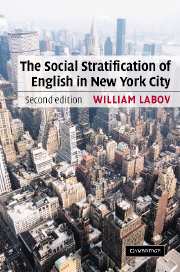Book contents
- Frontmatter
- Contents
- Introductory note
- Preface to the first edition
- Preface to the second edition: forty years later
- I Problems and methods of analysis
- 1 The study of language in its social context
- 2 First approach to the structure of New York City English
- 3 The social stratification of (r) in New York City department stores
- 4 The isolation of contextual styles
- 5 The linguistic interview
- 6 The survey of the Lower East Side
- II Social differentiation
- III Social evaluation
- IV Synthesis
- Glossary of linguistic symbols and terminology
- Appendix A Questionnaire for the ALS Survey
- Appendix B Anonymous observations of casual speech
- Appendix C Analysis of losses through moving of the MFY sample population
- Appendix D Analysis of the non-respondents: the television interview
- Appendix E The out-of-town speakers
- Bibliography
- Index
1 - The study of language in its social context
Published online by Cambridge University Press: 18 December 2009
- Frontmatter
- Contents
- Introductory note
- Preface to the first edition
- Preface to the second edition: forty years later
- I Problems and methods of analysis
- 1 The study of language in its social context
- 2 First approach to the structure of New York City English
- 3 The social stratification of (r) in New York City department stores
- 4 The isolation of contextual styles
- 5 The linguistic interview
- 6 The survey of the Lower East Side
- II Social differentiation
- III Social evaluation
- IV Synthesis
- Glossary of linguistic symbols and terminology
- Appendix A Questionnaire for the ALS Survey
- Appendix B Anonymous observations of casual speech
- Appendix C Analysis of losses through moving of the MFY sample population
- Appendix D Analysis of the non-respondents: the television interview
- Appendix E The out-of-town speakers
- Bibliography
- Index
Summary
The work which is reported in this study is an investigation of language within the social context of the community in which it is spoken. It is a study of a linguistic structure which is unusually complex, but no more so than the social structure of the city in which it functions.Within the linguistic structure, change has occurred on a large scale, and at a rapid pace which is even more characteristic of the changing structure of the city itself. Variability is an integral part of the linguistic system, and no less a part of the behavior of the city.
To assess the relative complexity of the linguistic problem presented by New York City, it may be useful to compare this investigation to an earlier study of a sound change in progress that I carried out on the island of Martha's Vineyard (Labov 1963). This earlier work traced the distribution of a particular sound feature as it varied through several occupational, ethnic, and geographic sub-groups of the population, and through three generations of native islanders. The objective pattern of language behavior was seen to be correlated with the overall social pattern of differential reaction to specific economic strains and social pressures; it was then possible to assign a single social meaning to the linguistic feature in question. It was thus demonstrated that social pressures are continually acting upon the structure of a language, as it develops through the mechanism of imitation and hypercorrection.
- Type
- Chapter
- Information
- Publisher: Cambridge University PressPrint publication year: 2006
- 2
- Cited by



